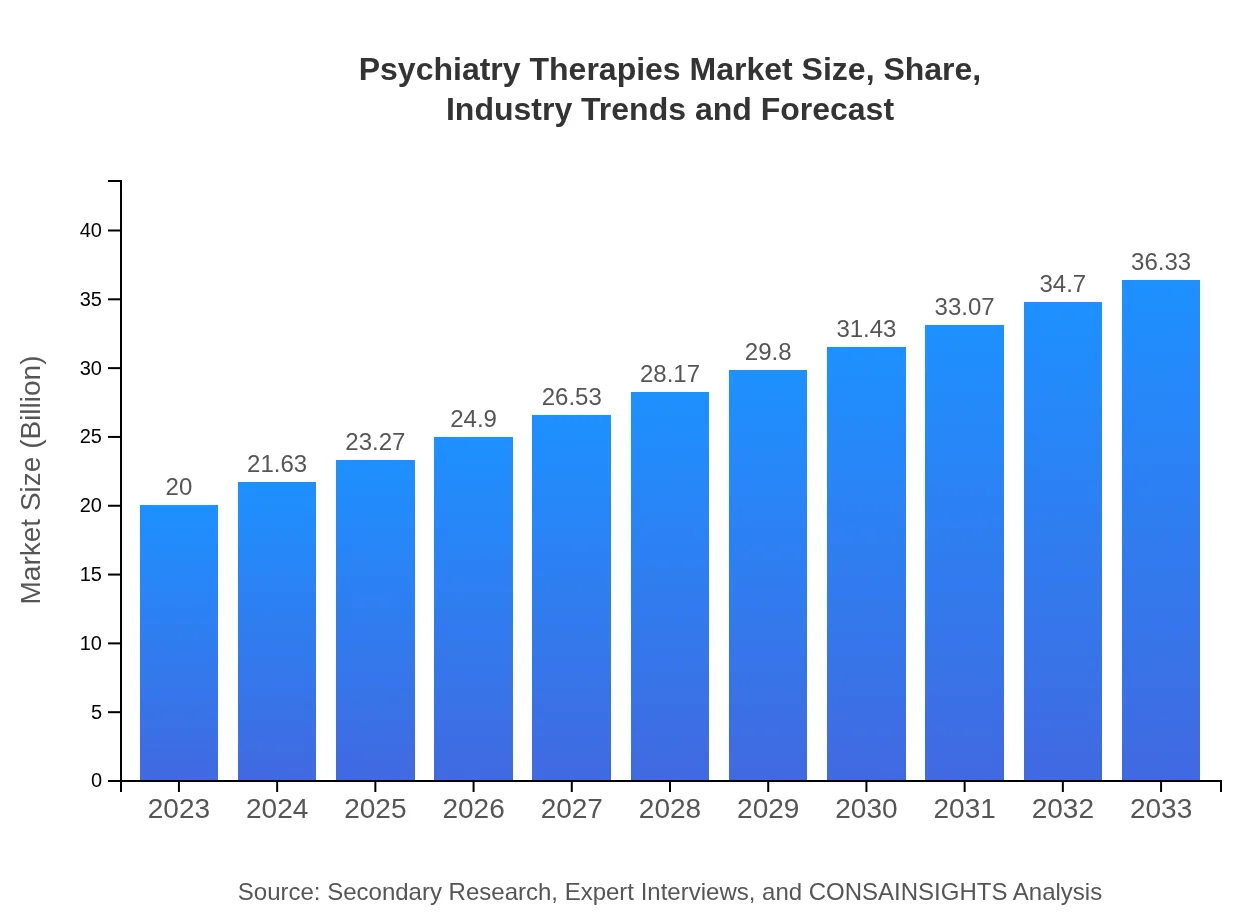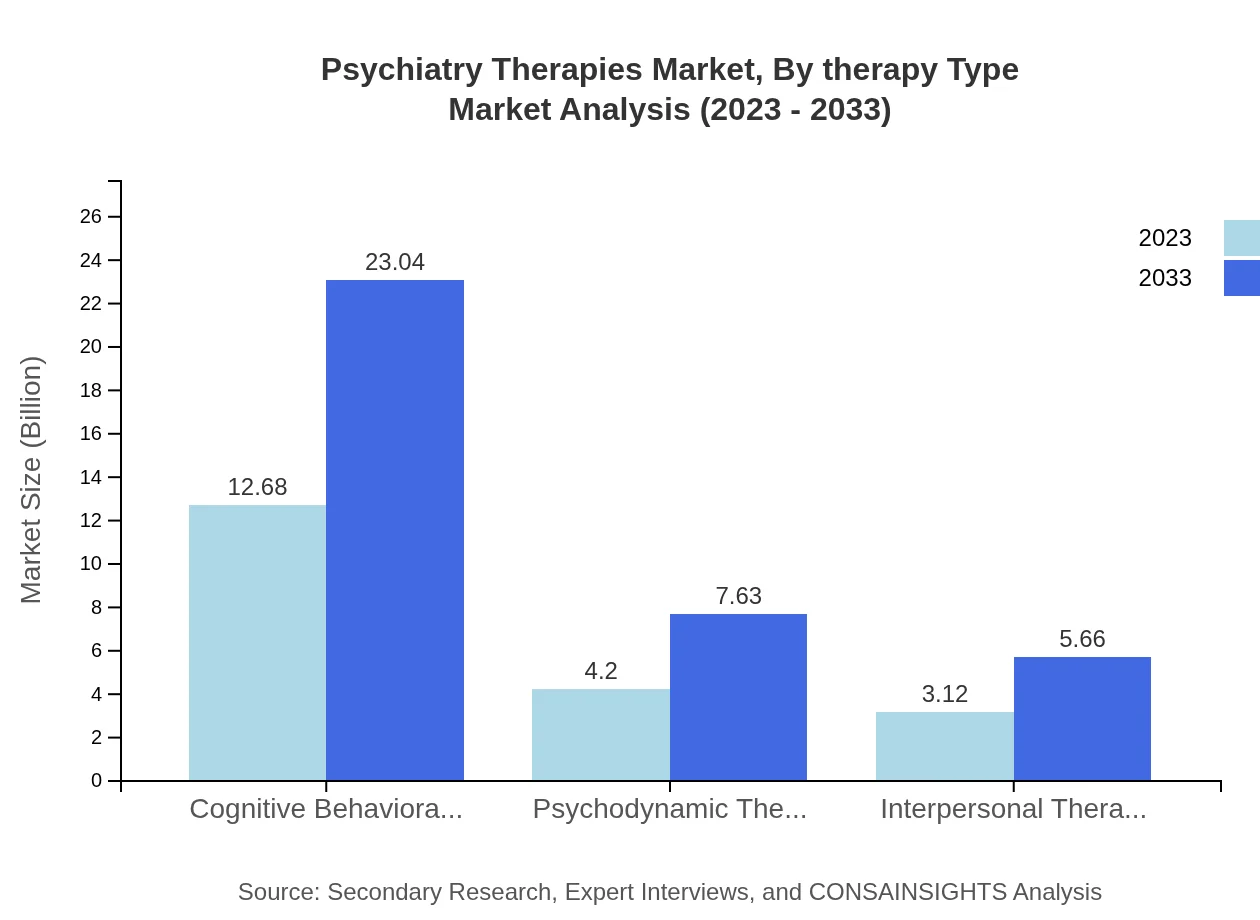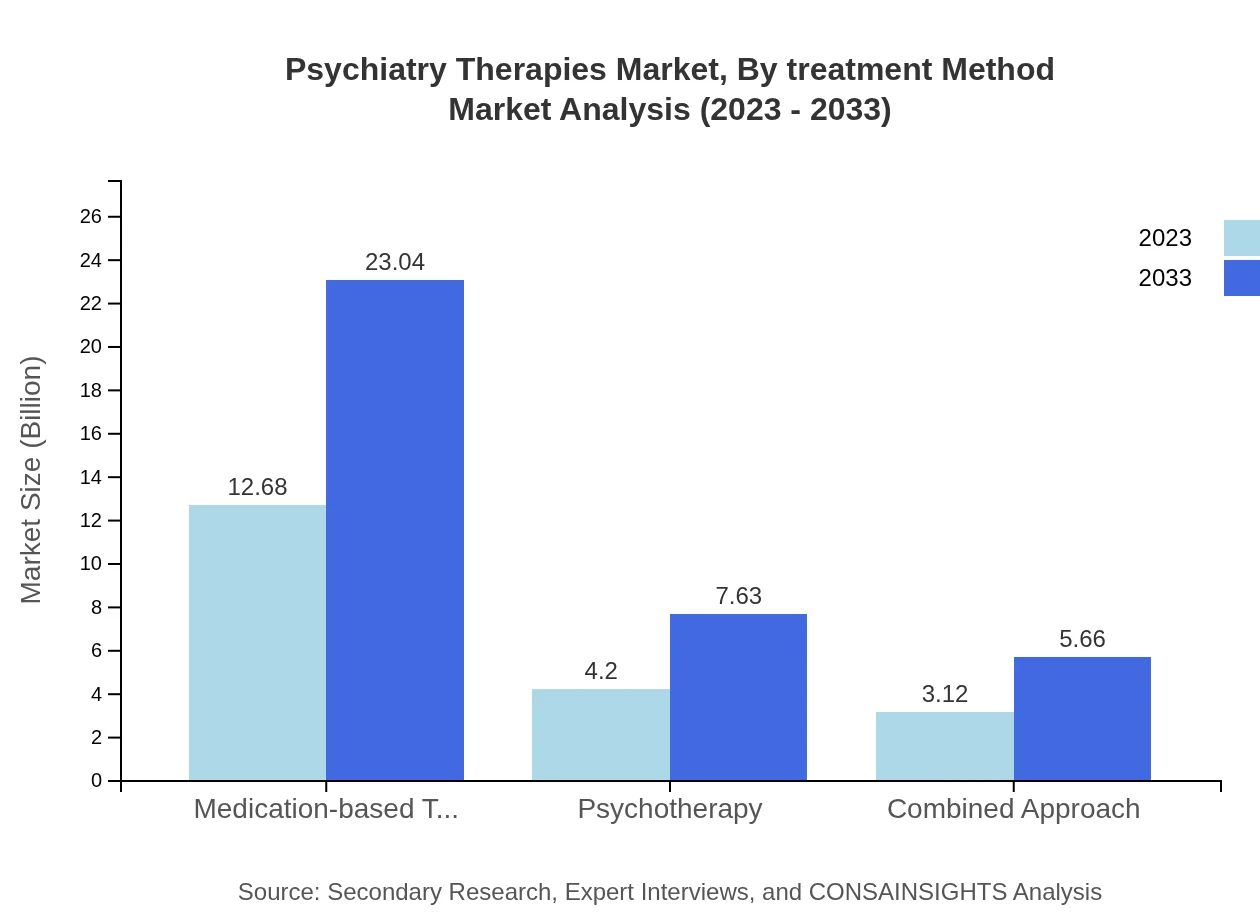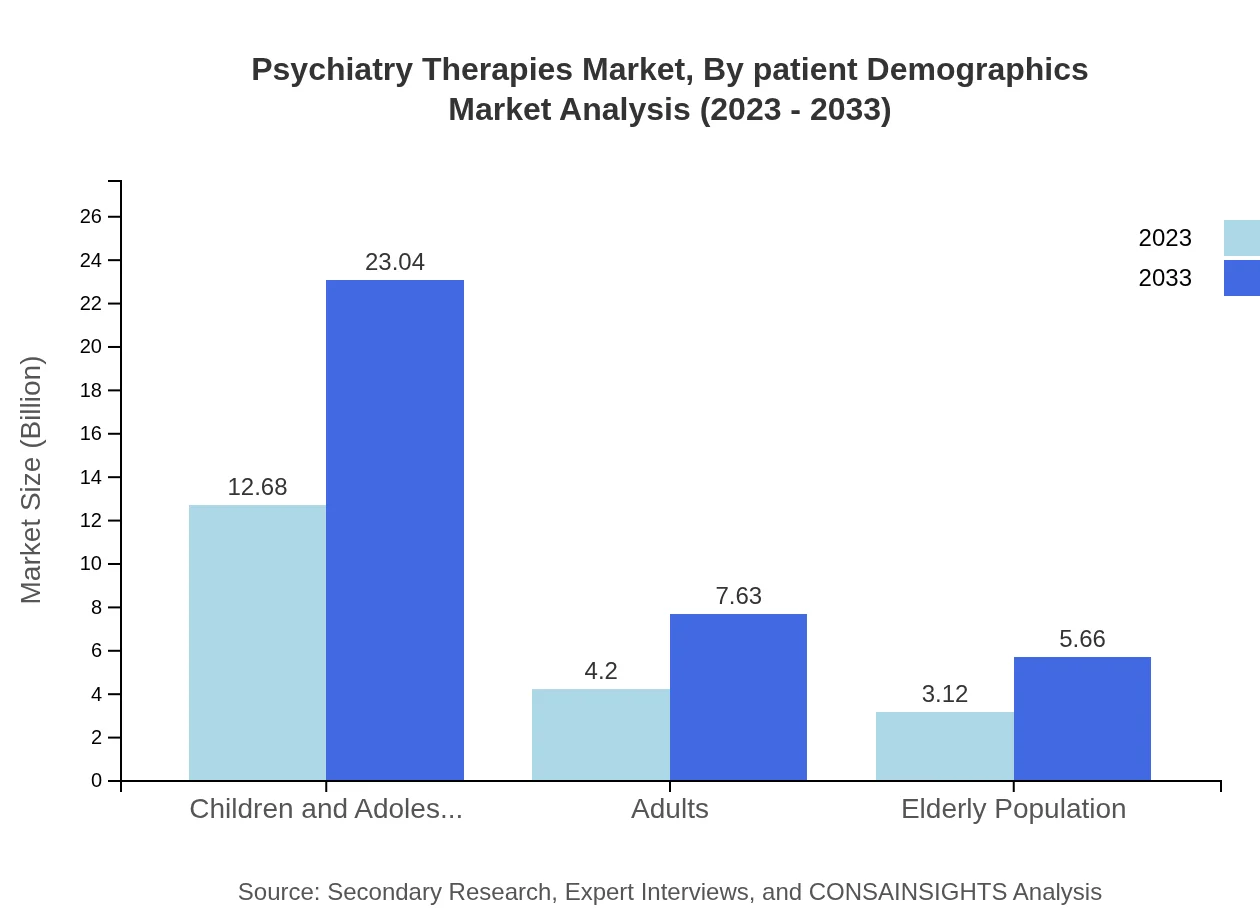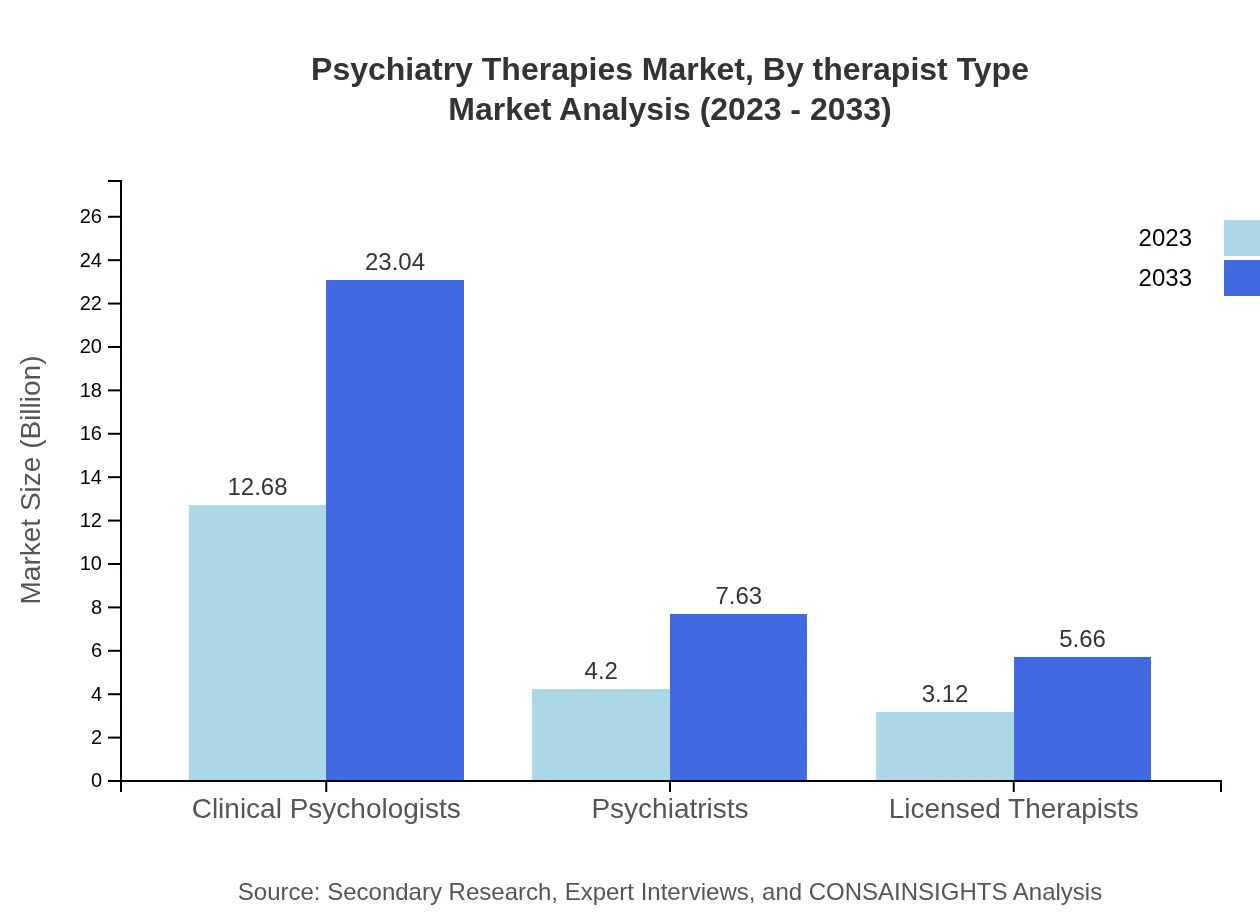Psychiatry Therapies Market Report
Published Date: 31 January 2026 | Report Code: psychiatry-therapies
Psychiatry Therapies Market Size, Share, Industry Trends and Forecast to 2033
This report provides an in-depth analysis of the Psychiatry Therapies market, encompassing historical trends and future insights for 2023 to 2033. Key focus areas include market size, growth potential, segmentation, regional analysis, technological advancements, and competitive landscape.
| Metric | Value |
|---|---|
| Study Period | 2023 - 2033 |
| 2023 Market Size | $20.00 Billion |
| CAGR (2023-2033) | 6% |
| 2033 Market Size | $36.33 Billion |
| Top Companies | Therapist Locator Inc., BetterHelp, Talkspace, MDLIVE |
| Last Modified Date | 31 January 2026 |
Psychiatry Therapies Market Overview
Customize Psychiatry Therapies Market Report market research report
- ✔ Get in-depth analysis of Psychiatry Therapies market size, growth, and forecasts.
- ✔ Understand Psychiatry Therapies's regional dynamics and industry-specific trends.
- ✔ Identify potential applications, end-user demand, and growth segments in Psychiatry Therapies
What is the Market Size & CAGR of Psychiatry Therapies market in 2023?
Psychiatry Therapies Industry Analysis
Psychiatry Therapies Market Segmentation and Scope
Tell us your focus area and get a customized research report.
Psychiatry Therapies Market Analysis Report by Region
Europe Psychiatry Therapies Market Report:
Europe's Psychiatry Therapies market, valued at USD 5.80 billion in 2023, is expected to escalate to USD 10.53 billion by 2033. Factors such as increased prevalence of mental health disorders, policy reforms enhancing mental healthcare access, and ongoing initiatives aimed at destigmatizing mental health treatment are propelling market growth.Asia Pacific Psychiatry Therapies Market Report:
The Asia Pacific region represents a growing market for Psychiatry Therapies, estimated at USD 4.00 billion in 2023 and expected to reach USD 7.27 billion by 2033. This growth is attributed to increasing mental health awareness, government initiatives to improve mental health services, and a surge in demand for psychological therapies. Cultural shifts towards accepting mental health treatment are fostering opportunities for new therapy practices.North America Psychiatry Therapies Market Report:
In North America, the Psychiatry Therapies market is projected to increase from USD 7.17 billion in 2023 to USD 13.03 billion by 2033. The region exhibits high demand for mental health services, driven by a greater focus on mental health, expanded insurance coverage for therapy services, and the integration of technology in therapy provisions including telehealth.South America Psychiatry Therapies Market Report:
The South American Psychiatry Therapies market is anticipated to grow from USD 1.11 billion in 2023 to USD 2.02 billion by 2033. Factors such as increasing urbanization, enhanced healthcare access, and efforts to reduce the stigma around mental health issues are driving this growth. Additionally, there are expanding networks of mental health professionals in this region, contributing to market dynamics.Middle East & Africa Psychiatry Therapies Market Report:
The Middle East and Africa region has a Psychiatry Therapies market currently worth USD 1.92 billion, projected to grow to USD 3.48 billion by 2033. This growth is supported by rising mental health awareness, ongoing healthcare improvements, and advancements in policy frameworks aimed at enhancing mental health services across this diverse region.Tell us your focus area and get a customized research report.
Psychiatry Therapies Market Analysis By Therapy Type
Dominating the Psychiatry Therapies market is Cognitive Behavioral Therapy (CBT), which is projected to grow from USD 12.68 billion in 2023 to USD 23.04 billion by 2033. While it held a market share of 63.42% in 2023, this is expected to remain stable through 2033. Psychodynamic therapy and Interpersonal Therapy (IPT) are also significant, with respective 2023-2033 growth projections of USD 4.20 to USD 7.63 billion and USD 3.12 to USD 5.66 billion.
Psychiatry Therapies Market Analysis By Treatment Method
The product analysis indicates that Medication-based Treatments will similarly reach USD 12.68 billion in 2023, with expected growth to USD 23.04 billion by 2033. Psychotherapy will face comparable increases from USD 4.20 billion to USD 7.63 billion during the same period, while the Combined Approach will enjoy growth from USD 3.12 billion to USD 5.66 billion.
Psychiatry Therapies Market Analysis By Patient Demographics
Children and adolescents represent a key segment, with the market size anticipated to grow from USD 12.68 billion in 2023 to USD 23.04 billion by 2033. Adults and the elderly segments are also showing robust growth, projected at USD 4.20 billion to USD 7.63 billion and USD 3.12 billion to USD 5.66 billion respectively.
Psychiatry Therapies Market Analysis By Therapist Type
Clinical Psychologists are leading the therapist type segment, projected to grow from USD 12.68 billion in 2023 to USD 23.04 billion by 2033, maintaining a steady share. Psychiatrists and Licensed Therapists are also expected to grow from USD 4.20 billion to USD 7.63 billion and USD 3.12 billion to USD 5.66 billion, respectively.
Psychiatry Therapies Market Trends and Future Forecast
Tell us your focus area and get a customized research report.
Global Market Leaders and Top Companies in Psychiatry Therapies Industry
Therapist Locator Inc.:
A leading provider connecting patients with qualified mental health professionals through an innovative platform.BetterHelp:
A prominent online counseling service that utilizes teletherapy to provide accessible mental health support.Talkspace:
One of the foremost telehealth providers, offering cognitive behavioral therapy and various mental health services online.MDLIVE:
An extensive telemedicine service providing not only psychiatry care but also options for general health services.We're grateful to work with incredible clients.









FAQs
What is the market size of psychiatry Therapies?
The global psychiatry-therapies market is currently valued at approximately $20 billion, with a projected CAGR of 6% from 2023 to 2033. This growth indicates a consistent demand for various therapeutic practices in the field.
What are the key market players or companies in this psychiatry Therapies industry?
Key players in the psychiatry-therapies industry include prominent healthcare providers and pharmaceutical companies specializing in mental health treatments. Their extensive portfolios encompass both medication-based and therapeutic interventions, focusing on enhancing treatment efficacy.
What are the primary factors driving the growth in the psychiatry Therapies industry?
Growth in the psychiatry-therapies industry is primarily driven by increasing awareness of mental health issues, rising incidence of mental health disorders, and advancements in therapy techniques. Additionally, government initiatives promoting mental health care play a significant role.
Which region is the fastest Growing in the psychiatry Therapies?
The fastest-growing region in the psychiatry-therapies market is Europe, projected to grow from $5.80 billion in 2023 to $10.53 billion by 2033. Other regions like Asia-Pacific and North America also show significant growth potential.
Does ConsaInsights provide customized market report data for the psychiatry Therapies industry?
Yes, ConsaInsights offers customized market report data tailored to specific client needs within the psychiatry-therapies industry. This allows stakeholders to access detailed insights relevant to their strategic decision-making.
What deliverables can I expect from this psychiatry Therapies market research project?
Deliverables from the psychiatry-therapies market research project typically include a comprehensive report featuring market size, growth forecasts, competitive analysis, regional breakdowns, and detailed insights on therapeutic segments and trends.
What are the market trends of psychiatry Therapies?
Current market trends in psychiatry-therapies include a shift towards integrated care models, increased adoption of teletherapy, and a rising preference for evidence-based practices like Cognitive Behavioral Therapy. These trends point to an evolving landscape focused on patient-centered care.

